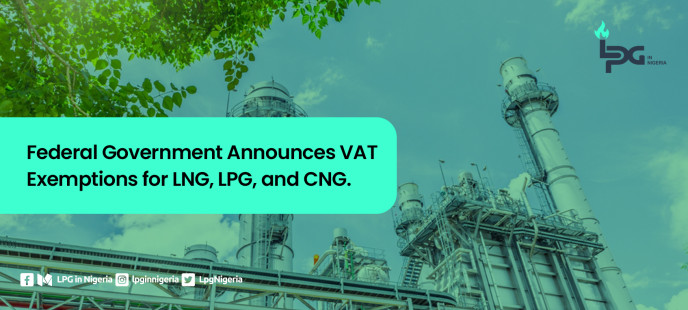- 4239
- 0
Sharing Ideas and Updates on LPG in Nigeria and related information to enable effective collaboration within the LPG Value Chain
Federal Government Announces VAT Exemptions For LNG, LPG, And CNG.

The Federal Government has announced value-added tax (VAT) exemptions on several energy products, including diesel, Liquefied Natural Gas (LNG), Compressed Natural Gas (CNG), Liquefied Petroleum Gas (LPG), electric vehicles, and clean cooking equipment. These exemptions, introduced through the VAT Modification Order 2024, are intended to reduce living costs, improve energy security, and support Nigeria’s transition to cleaner energy sources.
In addition to the VAT exemptions, new tax incentives have been introduced for deep offshore oil operations and gas production under the Oil & Gas Companies (Tax Incentives, Exemption, Remission, etc.) Order 2024. These incentives are designed to position Nigeria’s deep offshore basin as a prime location for global oil and gas investments.
These reforms are part of a broader set of investment-driven policies spearheaded by President Bola Ahmed Tinubu, reflecting the administration's commitment to sustainable growth in the energy sector and boosting Nigeria’s global competitiveness in oil and gas production.
My Perspective: The Federal Government’s recent announcement of VAT exemptions on key energy products and new tax incentives for deep offshore oil and gas production is a significant move towards addressing two pressing issues in Nigeria—rising energy costs and the urgent need for cleaner, more sustainable energy solutions.
From my perspective, this policy shift couldn't come at a better time. With Nigerians feeling the squeeze from high living costs and global inflation, removing VAT on essentials like LPG, CNG, and electric vehicles will provide much-needed relief. It's not just about lowering the cost of living; it's about empowering the everyday Nigerian households to embrace more affordable, sustainable, and cleaner energy sources.
Additionally, the tax incentives aimed at deep offshore oil and gas investments signal a proactive approach to ensuring that Nigeria remains competitive in the global energy market. The government’s focus on fostering investment is a crucial step towards economic sustainability, job creation, and energy security.
I believe that this is the right direction for Nigeria's energy sector. It aligns with the country's Energy Transition Plan and shows a clear commitment to environmental sustainability, economic growth, and enhancing the lives of everyday Nigerians. However, the key to the success of these reforms lies in how effectively they are implemented and whether the intended benefits reach the people who need them most.
Source: News Online.
















0 Comment.